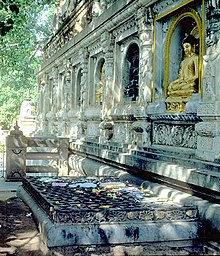

Bodhimaṇḍa (Sanskrit and Pali) or daochang (traditional Chinese: 道場; ; pinyin: dàochǎng) is a term used in Buddhism meaning the "position of awakening". According to Haribhadra, it is "a place used as a seat, where the essence of enlightenment is present".
Bodhimaṇḍas are regularly visited by Buddhist pilgrims, and some have gone on to become popular secular tourist destinations as well. In many forms of Buddhism, it is believed that bodhimaṇḍas are spiritually pure places, or otherwise conducive to meditation and enlightenment.
Famous bodhimaṇḍas in India
- The Vajrasana, Bodh Gaya: Gautama Buddha
- Mount Potalaka: Avalokiteśvara Bodhisattva
Famous bodhimaṇḍas in China
- Mount Putuo: Avalokiteśvara Bodhisattva
- Mount Emei: Samantabhadra Bodhisattva
- Mount Wutai: Mañjuśrī Bodhisattva
- Mount Jiuhua: Kṣitigarbha Bodhisattva
See also
- Dojo and dojang, two types of buildings whose names are written with the same Chinese characters used for daochang
References
- Thurman, Robert (1992). The Holy Teaching of Vimalakīrti: A Mahāyāna Scripture. University Park, Penn.: Pennsylvania State University Press. p. 138. ISBN 9780271006017. OCLC 613319979.
This Buddhism-related article is a stub. You can help Misplaced Pages by expanding it. |